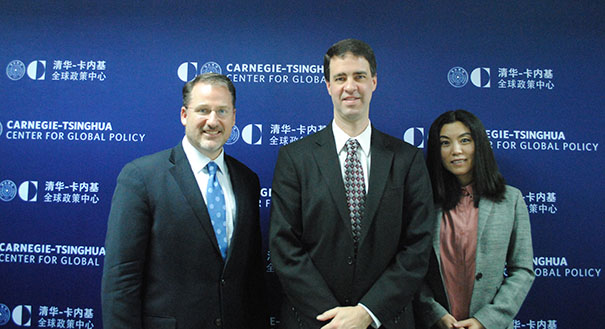{
"authors": [
"Paul Haenle",
"Matt Ferchen",
"Jiang Heng"
],
"type": "event",
"centerAffiliationAll": "",
"centers": [
"Carnegie Endowment for International Peace",
"Carnegie China"
],
"collections": [
"China’s Foreign Relations",
"U.S.-China Relations"
],
"englishNewsletterAll": "",
"nonEnglishNewsletterAll": "",
"primaryCenter": "Carnegie China",
"programAffiliation": "",
"programs": [],
"projects": [],
"regions": [
"North America",
"United States",
"East Asia",
"China"
],
"topics": [
"Security",
"Economy",
"Arms Control"
]
}
China, Development, and Global Security: Bridging the Gaps
Wed, December 14th, 2016
Carnegie-Tsinghua Center, Beijing
China’s evolving role in global affairs has spawned a growing debate among policymakers, academics, and citizens around the world on what impact it will have on the regional and global order. China portrays its rise as contributing to greater global prosperity and peace, but many observers outside of China worry that China’s more assertive posture on both international economic and security issues has the potential to jeopardize existing global dynamics. These conflicting paradigms have led to oversimplifications of China’s international impact and influence—often neglecting the interplay between economics and geopolitics. How can a more balanced understanding of China’s international political economy, in particular the relationship between economic development and global security, be constructed?
Matt Ferchen, a resident scholar at the Carnegie–Tsinghua Center for Global Policy, helped to answer this question by presenting the findings of his new paper “China, Economic Development, and Global Security: Bridging the Gaps.” Carnegie–Tsinghua Center Director Paul Haenle moderated the discussion on how policymakers, academics, and think tanks can broaden their understanding and research on China’s expanding global footprint.
This event was off the record.
Discussion Highlights
- An Expanding Geopolitical Strategy: There are two prevailing perspectives on China’s economy and its geopolitical strategy, panelists said. The first states that China is using its increasing role in the global economy as a state-led, calculated effort to heighten its influence, one panelist noted. Based on China’s relations in Africa and its development investments in neighboring countries, a panelist noted that proponents of this framework have identified a broader strategy behind China’s initiatives—one that seeks greater power and leverage both regionally and internationally.
- Peaceful Development Paradigm: The second perspective, a panelist said, asserts that China’s development is peaceful and will bring regional harmony. In a 2011 government white paper, a panelist said, the idea of peaceful development was outlined as meaning that China needs a peaceful environment to develop in and interact with international players economically. Such an environment would allow China to contribute to maintaining global peace through international development, the panelist added. This view, most panelists argued, emphasizes the importance of economic diplomacy in South-South relations, and views China’s relations with other developing countries as complementary.
- Inadequacy of Previous Theories: The narrow understanding of China put forward by previous paradigms may negatively impact U.S.-China relations, one discussant warned. Historically, economic might has seldom been equivalent to global stature, the panelist argued, which challenges a fundamental assumption of the geoeconomic paradigm. The peaceful development paradigm also neglects many areas of tension in China’s relationship with the developing world, the panelist added. Moreover, discussants pointed out, economic factors alone rarely solve geopolitical issues.
- The Gap Between Theory and Practice: A discussant argued that there is a gap between the two prevailing paradigms and the reality of China’s foreign relations that comes from China’s fast-changing role. For example, China’s outbound direct investments exceeded its foreign direct investments for the first time at the end of 2014, marking a turning point in the country’s foreign relations. This calls for a departure from previous assumptions, as well as a recognition of the new normal in China’s economic relations, according to a panelist. Other discussants agreed that the narrow specializations fueled by the existing paradigms have clouded the scope of academic and policy-focused research.
- A New Perspective on China’s International Political Economy: Going forward, discussants contended that academics and policymakers should stop thinking in separate and rigid categories such as economics, geopolitics, and security. Rather, the discussants agreed, there need to be more boundary-breaking ways of interpreting President Xi Jinping’s foreign policy choices. Given President-elect Trump’s business background, his administration will likely rely on the mercantilist interpretation of China’s development. This may exacerbate an already tense U.S.-China relationship that discussant said creates an urgent need to think creatively about China, especially in terms of the relationship between development and security.
Paul Haenle
Paul Haenle is the director of the Carnegie–Tsinghua Center for Global Policy based at Tsinghua University in Beijing. Haenle’s research focuses on Chinese foreign policy and U.S.-China relations.
Matt Ferchen
Matt Ferchen is a resident scholar at the Carnegie–Tsinghua Center for Global Policy, where he runs the China and the Developing World Program.
Jiang Heng
Jiang Heng is the vice president of the Beijing New Century Academy on Transnational Corporations where she works on trade and economic cooperation issues.
Carnegie does not take institutional positions on public policy issues; the views represented herein are those of the author(s) and do not necessarily reflect the views of Carnegie, its staff, or its trustees.
Event Speakers
Paul Haenle held the Maurice R. Greenberg Director’s Chair at the Carnegie Endowment for International Peace and is a visiting senior research fellow at the East Asian Institute, National University of Singapore. He served as the White House China director on the National Security Council staffs of former presidents George W. Bush and Barack Obama.
Ferchen specializes in China’s political-economic relations with emerging economies. At the Carnegie–Tsinghua Center for Global Policy, he ran a program on China’s economic and political relations with the developing world, including Latin America.
Jiang Heng

